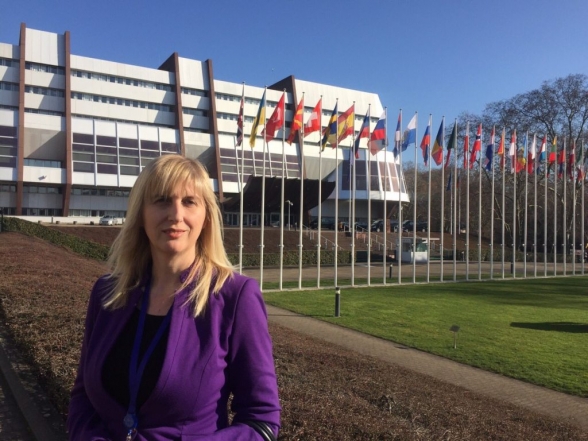On day two of the Winter Session, the Parliamentary Assembly of the Council of Europe (PACE) held a consolidated discussion on Nagorno-Karabakh and a discussion on the report “Introduction of sanctions against parliamentarians”. Request for partner for democracy status with the Parliamentary Assembly submitted by the Parliament of Jordan was also discussed.
Following a consolidated discussion, the Assembly adopted a resolution “Inhabitants of frontier regions of Azerbaijan are deliberately deprived of water”, which emphasised that the state of disrepair of the Sarsang dam, located in one of the areas of Azerbaijan occupied by Armenia “poses a danger to the whole border region”. The parliamentarians called on the Armenian authorities to cease using water resources as tools of political influence and withdraw their armed forces, allowing access by independent engineers and hydrologists to the Sarsang dam, for the purpose of carrying out a detailed on-the-spot survey.
Proposal for resolution “Escalation of violence in Nagorno-Karabakh and the other occupied territories of Azerbaijan”, which was also debated, was not supported by a necessary majority.
During the afternoon hours, parliamentarians adopted the Resolution 2087 (2016) “Introduction of sanctions against parliamentarians”, which expressed concern over the introduction of reciprocal direct sanctions against parliamentarians as a consequence of political situation in Europe and after the annexation of Crimea by Russia. PACE voiced regret over the existence of national “blacklists” of parliamentarians to whom the States which have drawn them up can refuse visas or entry. These sanctions, which also affect some parliamentarians of the Parliamentary Assembly, are particularly harmful to parliamentary diplomacy. Hence, the Assembly calls Member States to implement a set of measures, and in accordance with commitments which they have undertaken by their membership to the Council of Europe, guarantee the freedom of movement to Assembly members.
The Parliamentary Assembly, at today’s session, decided today to grant the Jordanian Parliament Partner for Democracy Status, and invited the Parliament to appoint a delegation from among the democratically-elected MPs, composed of three members and three substitute members. The resolution adopted on this occasion notes the need for deepening and continuing reforms towards the consolidation of democratic institutions, establishing the rule of law and respect of human rights in Jordan. The Assembly will review, within two years, the progress achieved in implementing the political commitments entered into by the Jordanian Parliament and the aforementioned reforms.
Mr Rosen Plevneliev, President of Bulgaria, and Mr Thorbjørn Jagland, Secretary General of the Council of Europe, addressed the Parliamentary Assembly today.
As a part of elections and appointments, Mr Georgios A. Serghides was elected judge of the European Court of Human Rights in respect of Cyprus.
On day three of the session, a consolidated discussion will be devoted to migrations. With regard to international terrorism, reports on "Combating international terrorism while protecting Council of Europe standards and values" and "Foreign fighters in Syria and Iraq" will be the focus of discussions. The Assembly will also discuss the issue of credentials of the Moldovan delegation.
Member of Delegation of the Parliament of Montenegro Ms Snežana Jonica is participating in the Winter Session of the Parliamentary Assembly of the Council of Europe.








